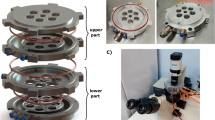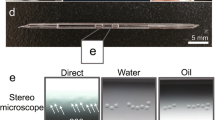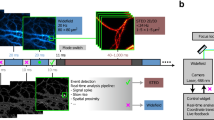Abstract
THE need for maintenance of incubation temperatures while observing tissue cultures under the microscope has led to the development, in this laboratory, of an ‘air wall’ incubator. The method makes use of downward directed, heated air which passes over the microscope stage, thus providing a warm field within which incubation temperatures are maintained. The apparatus was fashioned from inexpensive equipment. It eliminates the need for the customary bulky enclosures, and therefore permits unhindered access to the microscope. It is independent of, and easily adaptable to, any microscope and is now in continuous use in this laboratory on a Cooke, Troughton and Simms inverted microscope. A stage-level temperature of 37° ±0.5°C has been maintained for as long as 6 h. There is no reason why such temperatures cannot be maintained indefinitely.
This is a preview of subscription content, access via your institution
Access options
Subscribe to this journal
Receive 51 print issues and online access
$199.00 per year
only $3.90 per issue
Buy this article
- Purchase on Springer Link
- Instant access to full article PDF
Prices may be subject to local taxes which are calculated during checkout
Similar content being viewed by others
Author information
Authors and Affiliations
Rights and permissions
About this article
Cite this article
GORDON, H. An ‘Air Wall’ Incubator for Microscopy. Nature 202, 1035–1036 (1964). https://doi.org/10.1038/2021035a0
Issue Date:
DOI: https://doi.org/10.1038/2021035a0
Comments
By submitting a comment you agree to abide by our Terms and Community Guidelines. If you find something abusive or that does not comply with our terms or guidelines please flag it as inappropriate.



